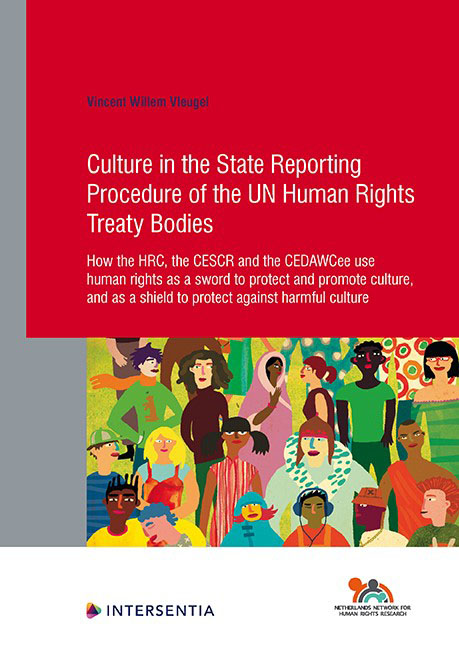 Culture in the State Reporting Procedure of the UN Human Rights Treaty Bodies
Culture in the State Reporting Procedure of the UN Human Rights Treaty Bodies Book contents
- Frontmatter
- Acknowledgements
- Contents
- Abbreviations
- Note on Citation Formats
- Note on Grammar
- Chapter 1 Introduction
- Chapter 2 Human Rights and Cultural Diversity. Between and Beyond Universalism and Cultural Relativism
- Chapter 3 UN Treaty Bodies. Treaties, Committees, Working Methods
- Chapter 4 Human Rights as a Sword. To Protect and Promote Cultural Diversity
- Chapter 5 Human Rights as a Shield. To Protect against Harmful Aspects of Culture
- Chapter 6 Cultural Argumentation. The State Reporting Procedure as a Platform for Cross-Cultural Dialogue
- Chapter 7 Conclusions. How the Treaty Bodies Universalise Human Rights
- Bibliography
- Summary
- Samenvatting
- Human Rights Research Series
Samenvatting
Published online by Cambridge University Press: 11 November 2021
- Frontmatter
- Acknowledgements
- Contents
- Abbreviations
- Note on Citation Formats
- Note on Grammar
- Chapter 1 Introduction
- Chapter 2 Human Rights and Cultural Diversity. Between and Beyond Universalism and Cultural Relativism
- Chapter 3 UN Treaty Bodies. Treaties, Committees, Working Methods
- Chapter 4 Human Rights as a Sword. To Protect and Promote Cultural Diversity
- Chapter 5 Human Rights as a Shield. To Protect against Harmful Aspects of Culture
- Chapter 6 Cultural Argumentation. The State Reporting Procedure as a Platform for Cross-Cultural Dialogue
- Chapter 7 Conclusions. How the Treaty Bodies Universalise Human Rights
- Bibliography
- Summary
- Samenvatting
- Human Rights Research Series
Summary
HOOFDSTUKINTRODUCTIE
Het debat over de universaliteit van mensenrechten in relatie tot culturele diversiteit duurt onverminderd voort, al vanaf de totstandkoming van de Universele Verklaring van de Rechten van de Mens in 1948. De laatste jaren is er zelfs sprake van een heropleving van dit debat. Tegelijkertijd wordt het debat steeds minder vaak gevat in termen van tegenstellingen, en steeds meer in termen van het verenigen van universele mensenrechtennormen en culturele verscheidenheid. Het internationale mensenrechtenkader biedt ruimte aan Staten om culturele eigenheden in acht te nemen bij het implementeren van de VN-mensenrechtenverdragen. De VN-verdragsorganen die toezicht houden op de implementatie van de verdragen door Staten hebben de taak om de universaliteit van mensenrechten te waarborgen tegen een achtergrond van grote culturele verscheidenheid.
Er is uitgebreid onderzoek gedaan naar deze spanning tussen universaliteit en culturele diversiteit. Dit heeftgeleid tot veel aandacht voor negatieve aspecten van cultuur, en relatief weinig aandacht voor de relatie tussen mensenrechten en positieve aspecten van cultuur. Daarnaast heefteerder onderzoek zich voornamelijk toegespitst op de wijze waarop cultuur een plek krijgt bij concrete gevallen van geschillenbeslechting, zoals in de jurisprudentie van het Europese Hof voor de Rechten van de Mens en in individuele klachten voor de VN-verdragsorganen. Er is minder bekend over de wijze waarop dit gebeurt in de Statenrapportageprocedure, waarbij Staten uitleg geven over hun vorderingen met de naleving van het betreffende VN-verdrag, en hierover met het betreffende VN-verdragsorgaan in discussie gaan.
De VN-verdragsorganen hebben een belangrijke rol bij het bewaken van een goed evenwicht tussen het waarborgen van de universaliteit van de betreffende rechten enerzijds, en het ruimte bieden voor culturele eigenheid in de invulling van die rechten door Staten anderzijds. Dit onderzoek beoogt te verduidelijken hoe de toezichthoudende VN-organen deze rol invullen.
De studie beperkt zich tot de toezichthouders van drie van deze VN-verdragen: het Mensenrechtencomité (MRC), dat toezicht houdt op het Internationaal Verdrag inzake Burger- en Politieke Rechten (IVBPR); het Comité voor Economische, Sociale en Culturele Rechten (CESCR), dat toezicht houdt op het Internationaal Verdrag inzake Economische, Sociale en Culture Rechten (IVESCR); en het Comité inzake de uitbanning van alle vormen van discriminatie van vrouwen (Vrouwenrechtencomité), dat toeziet op de naleving van het Verdrag inzake de uitbanning van alle vormen van discriminatie van vrouwen (Vrouwenrechtencomité), dat toeziet op de naleving van het Verdrag inzake de uitbanning van alle vormen van discriminatie tegen vrouwen (CEDAW).
- Type
- Chapter
- Information
- Culture in the State Reporting Procedure of the UN Human Rights Treaty BodiesHow the HRC, the CESCR and the CEDAWCee use human rights as a sword to protect and promote culture, and as a shield to protect against harmful culture, pp. 369 - 376Publisher: IntersentiaPrint publication year: 2020
